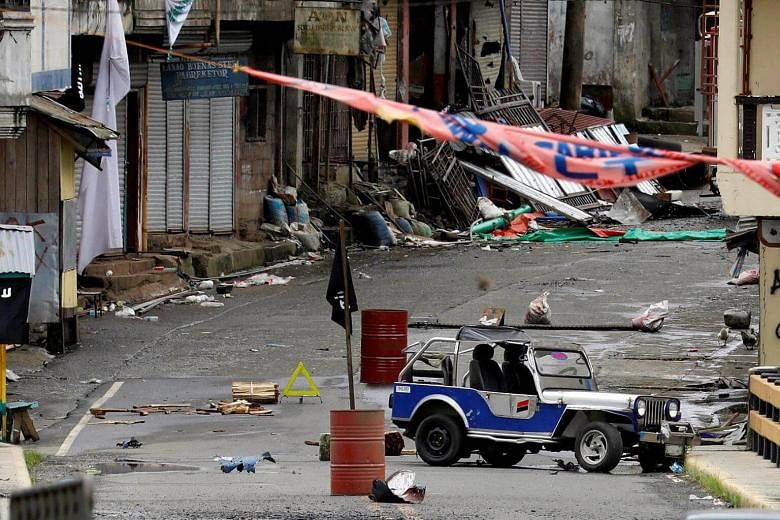South-east Asian countries will face long-term problems that could last for decades if militants are able to escalate their ongoing siege on the southern Philippine city of Marawi.
That was the consensus of defence ministers who met during a roundtable at the Shangri-La Dialogue, Defence Minister Ng Eng Hen told reporters after hosting the discussion yesterday for 22 visiting ministers and representatives.
About 400 militants linked to the Islamic State in Iraq and Syria (ISIS) terror group overran Marawi on May 23.
Philippine forces have deployed troops and airpower but are still trying to retake the city.
Dr Ng said if the situation "was allowed to even escalate or entrench, it would pose decades of problems for Asean cities and interests of other countries within Asean".
"All of us recognise that if not addressed adequately, it can prove a pulling ground for would-be jihadists who can launch attacks from there," he added.
The Marawi situation also underscored the importance of initiatives like the Sulu Sea patrols, which will be jointly conducted by Indonesia, Malaysia and the Philippines in the waters off southern Philippines.
The three countries had agreed in May last year to conduct coordinated sea patrols and establish a hotline to combat piracy and kidnappings in waters bordering the three nations.
Dr Ng added that many countries, including Singapore, have pledged support to help the Philippines deal with the problem.
"If they need help, we stand ready to help, whether it's information, intelligence or otherwise," he said.
Earlier yesterday, Malaysian Defence Minister Hishammuddin Hussein announced in a speech that maritime patrols in the area would start on June 19 and that a date for air patrols would soon be set.
Indonesian Defence Minister Ryamizard Ryacudu told The Sunday Times his country has invited Singapore to take part in the Sulu Sea patrols.
Mr Ryamizard said Indonesia has explored some "potential involvement of Singapore to join this effort", and that there is a "high possibility" of Singapore doing so.
Singapore had previously offered the assistance of the Information Fusion Centre in Changi Naval Base, which provides maritime data.
The spectre of terrorism is one of the key issues being discussed at the annual security summit, which began on Friday and ends today.
Datuk Seri Hishammuddin said the threat from ISIS was both "real and multi-dimensional" and had to be met head on. The menace is one Malaysia feels acutely, he added, pointing out the country arrested six people with links to ISIS in the past week, and has made 250 arrests between 2013 and last year.
He also said the Sulu Sea patrols, which will take place in an area ISIS has declared part of its "South-east Asia" caliphate, is a positive example of what even smaller groups within Asean can achieve.
"Between the three of us, there was a realisation that to face the militants, we do not need to get all 10 Asean countries together.
"Do not wait for everybody to agree - if you can get just three to agree on an objective... dealing with an enemy that is very clear and very focused, I will agree that we (are) able to do a bit more than what we are doing today."
Mr Hishammuddin added that the threat of terrorism highlighted the need for mechanisms such as the Five Power Defence Arrangements (FPDA) - a pact formed in 1971 between Australia, Britain, Malaysia, New Zealand and Singapore - as the means for countries to work together and share intelligence and information.
Cooperation and exercises under the FPDA also provide check and balance in this region, and will help ensure that if there are tensions, "cool heads and sound minds prevail at the end of the day", he said.
Dr Ng also held separate bilateral meetings with Mr Hishammuddin and Mr Ryamizard at the summit, where they discussed regional security issues, and agreed on the importance of stronger regional cooperation against the threat of terrorism.


